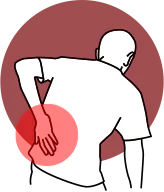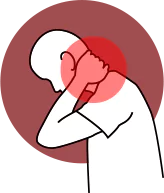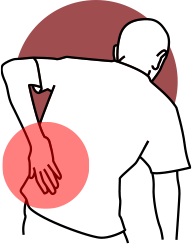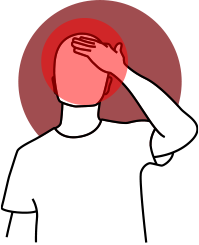Anxiety, PTSD And Chronic Pain Treatment
Chronic Pain
Types of Chronic Pain Conditions




Chronic Pain: Signs & Symptoms
- Reduced activity causes a loss of stamina and flexibility
- Mental issues such as sadness, anxiety, and irritability
- Muscular pains and joint discomfort
- Sleep issues
Chronic Pain Disorder
- Osteoarthritis: This form of arthritis happens when the protective cartilage between bones wears away due to normal wear and strain on the body.
- Back Pain: Back discomfort can be caused by muscular strains, nerve compression, or spinal arthritis.
- Inflammatory Bowel Disease: (IBD) is a disorder that causes persistent digestive tract inflammation, resulting in discomfort and cramping in the intestines.
What Causes Chronic Pain?
- Rheumatoid arthritis is an autoimmune illness that causes severe joint inflammation.
- Fibromyalgia is a neurological illness that causes pain and sensitivity throughout the body (known as trigger points).
- Surgical trauma
Chronic Pain Syndrome Treatment
- Pain-relieving drugs
- Anti-inflammatories, steroids, muscle relaxants, antidepressants with pain-relieving properties, and, in extreme circumstances, opioids are examples (this is the last resort).
- Physical treatment to improve range of motion and flexibility.
- Nerve blocks can be used to inhibit pain signals and get chronic pain relief.
Risk Factors Associated With Chronic Pain
- Those who are depressed: Experts aren’t sure why depression leads to chronic pain, but one explanation is that depression alters the way the brain receives and interprets nervous system impulses.
- Those who smoke: Researchers are looking at why smoking tends to make arthritis, fibromyalgia, and other chronic pain illnesses worse.
- Age as a factor: As you become older, you’re more susceptible to various diseases that might cause chronic pain.
When You Should Seek Medical Help For Chronic Pain?
- When your pain begins
- How it feels (for example, searing and acute or dull and aching)
- If your pain worsens.

Seek Help for Post-Traumatic Stress Disorder
Anxiety
Anxiety: Signs & Symptoms
- Feeling uneasy, restless, or uncomfortable.
- Having an elevated heart rate
- Persistent gastrointestinal (GI) problems
- Feeling compelled to avoid situations that cause distress.
Anxiety Disorders
- Agoraphobia: A condition in which you fear and avoid locations or circumstances that can make you anxious.
- Panic Disorder: It is characterized by recurring bouts of severe anxiety, dread, or terror that reaches a peak within minutes (panic attacks).
- Social Anxiety Disorder: Due to emotions of humiliation, self-consciousness, and concern about being judged, social anxiety disorder (social phobia) causes high anxiety, dread, and avoidance of social interactions.
How Is Anxiety Caused?




When To Seek A Doctor For Anxiety Disorder?
- You’re concerned that you’re worrying too much and affecting your career, relationships, or other elements of your life.
- You find it difficult to regulate your concerns or anxiety.
- You’re depressed, have issues with alcohol or drugs, or have co-existing mental health issues besides anxiety.
Treatment for Anxiety And PTSD at Padda Institute
Meditation Ritual Techniques
Medications
Acceptance And Commitment Therapy
Acceptance and Commitment Therapy (ACT) serves as the cornerstone of our approach, guiding individuals through a transformative journey toward mental and physical well-being. ACT, a mindful psychotherapy, empowers individuals to embrace the present moment, accepting thoughts and emotions without judgment while committing to constructive action.
We proficiently apply the principles of ACT to address a spectrum of challenges, including anxiety, depression, chronic pain, and substance abuse. Our guidance involves leading individuals through mindfulness exercises, and cultivating a compassionate relationship with difficult experiences. Our focus lies in facilitating this journey of acceptance, resilience, and commitment, empowering individuals to channel their energy towards healing and growth.
ACT Therapy For




Experts at Padda Institute
Padda Institute has one of the most experienced doctors in St. Louis & Bridgeton. We ensure the patient’s quality care and successful recovery, especially in chronic pain relief and long term pain management. You can review the testimonials from our clients.
